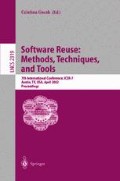Abstract
Project management is a knowledge intensive activity. Managers use their skills and experience to make decisions during the execution of a software development process. Better results in terms of attending to schedule, budget, and functionality, are usually achieved due to managers’ accumulated experiences and knowledge. In this paper we address the creation and reuse of software project management knowledge. We present a knowledge representation, namely scenario models, which allows a manager to verify the impact of theories, procedures, actions, and strategies that can be applied or imposed upon a software project. Scenario models compose a reusable knowledge base useful for project managers, who can reuse scenarios to assess the impact of their assumptions upon their projects. We present an application of the proposed approach within a risk management process and the results from a first experimental analysis of the techniques.
Access this chapter
Tax calculation will be finalised at checkout
Purchases are for personal use only
Preview
Unable to display preview. Download preview PDF.
References
Lucca, J., Sharda, R., Weiser, M. (2000) “Coordinating Technologies for Knowledge Management in Virtual Organizations”, in: Proceedings of the Academia/Industry Working Conference on Research Challenges (AIWORC’00), pp. 21–26
Dieng, R. (2000) “Knowledge Management and the Internet”, IEEE Intelligent Systems, Vol. 15, No. 3, pp 14–17, (May/June)
Brown, N. (1996) “Industrial-Strength Management Strategies”, IEEE Software, Vol. 13, No. 4, pp 94–103 (July)
Klein, G. (1998) Sources of Power, MIT Press, Cambridge, Massachusetts
deMarco, T. (1982) Controlling Software Projects. New York, NY: Yourdon Press, Inc.
Reel, J.S. (1999) “Critical Success Factors in Software Projects”, IEEE Software, Vol. 16, No. 3, pp. 18–23, (May/June)
Highsmith, J. (1992) “Software Ascents”, American Programmer Magazine (June)
Forrester, J.W. (1961) Industrial Dynamics, Cambridge, MA: The M.I.T. Press
Abdel-Hamid, T., Madnick, S.E. (1991) Software Project Dynamics: an Integrated Approach, Prentice-Hall Software Series, Englewood Cliffs, New Jersey
Tvedt, J.D. (1996) An Extensible Model for Evaluating the Impact of Process Improvements on Software Development Cycle Time, D.Sc. Thesis, Arizona State University, Tempe, AZ
Lin, C.Y., Abdel-Hamid, T., Sherif, J.S. (1997) “Software-Engineering Process Simulation Model (SEPS)”, Journal of Systems and Software, Vol. 37, pp. 263–277
Barros, M.O., Werner, C.M.L., Travassos, G.H. (2001) “From Models to Metamodels: Organizing and Reusing Domain Knowledge in System Dynamics Model Development”, Proceedings of the 19 th Conference of the System Dynamics Society, Atlanta, USA (July)
Jones, C. (2000) Software Assessments, Benchmarks, and Best Practices, Addison-Wesley Information Technology Series, Addison-Wesley Publishing Company, Reading, Massachusets
Wohlin, C, Runeson, P., Höst, M., Ohlsson, M.C., Regnell, B., Wesslén, A. (2000) Experimentation in Software Engineering: an Introduction, Kluver Academic Publishers, Norwell, Massachusets
Henninger, S. (1996) “Accelerating the Successful Reuse of Problem Solving Knowledge Through the Domain Lifecycle”, in Proceedings of the Fourth International Conference on Software Reuse, Orlando, USA, pp. 124–133
Yglesias, K.P. (1998) “IBM’s Reuse Programs: Knowledge Management and Software Reuse”, in Proceedings of the Fifth International Conference on Software Reuse, Victoria, Canada, pp. 156–165
Althoff, K., Birk, A., Hartkopf, S., Müller, W., Nick, M., Surmann, D., Tautz, C. (1999) “Managing Software Engineering Experience for Comprehensive Reuse”, in Proceedings of the 11 th International Conference on Software Engineering and Knowledge Engineering, Heidelberg, GR
Williamson, K.E., Healy, M.J., Barker, R.A. (2000) “Reuse of Knowledge at an Appropriate Level of Abstraction-Case Studies Using Specware” in Software Reuse: Advances in Software Reusability, Proceedings of 6th International Conference on Software Reuse, Vienna, Austria, pp. 58–73
Author information
Authors and Affiliations
Editor information
Editors and Affiliations
Rights and permissions
Copyright information
© 2002 Springer-Verlag Berlin Heidelberg
About this paper
Cite this paper
Barros, M.d.O., Werner, C.M.L., Travassos, G.H. (2002). Project Management Knowledge Reuse through Scenario Models. In: Gacek, C. (eds) Software Reuse: Methods, Techniques, and Tools. ICSR 2002. Lecture Notes in Computer Science, vol 2319. Springer, Berlin, Heidelberg. https://doi.org/10.1007/3-540-46020-9_16
Download citation
DOI: https://doi.org/10.1007/3-540-46020-9_16
Published:
Publisher Name: Springer, Berlin, Heidelberg
Print ISBN: 978-3-540-43483-2
Online ISBN: 978-3-540-46020-6
eBook Packages: Springer Book Archive

